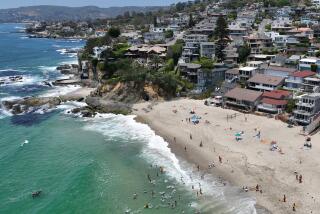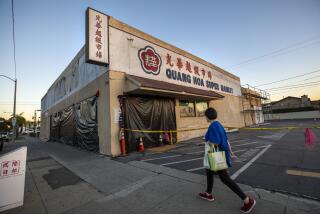Balboa Island still lives large
- Share via
The red-and-white ferry boats shuttling between Balboa Island and the Balboa Peninsula are still jammed with cars, shirtless teens and tourists on bicycles.
Luxury yachts -- many bigger than most motor homes -- still crowd the blue waters off the shores of the 128-acre island in Newport Bay.
And the rental rates for the island’s multimillion-dollar vacation homes -- up to $5,000 a week -- have barely dipped from last year’s prices.
Still, even this affluent vacation island, home to some of the most expensive real estate in the country, is feeling the sting of the economic maelstrom that has engulfed the nation.
While wealthy visitors keep paying top dollar to soak up the sun and sea breezes from spacious waterfront homes, merchants report a drop in sales; restaurants and grocers say more vacationers are preparing food at home instead of dining out; and real estate agents have cut rates for smaller, inland homes to attract last-minute bargain hunters.
Sales tax revenues for the first three months of the year fell nearly 30% from a year earlier, according to the most recent data available from the city of Newport Beach.
Balboa Island demonstrates that no tourism town in California is immune to the recession’s pain.
“Even the people who do have money are spending less,” said Helen Shull, owner of Even Sisters, a clothing and gift shop on Marine Avenue, the island’s main commercial street.
At the turn of the 20th century, this land was nothing more than a mud flat. Then an enterprising real estate promoter named William Collins began dredging the Newport Bay to create Balboa Island. Collins sold lots on the island for as little as $300 each, without sewer or water connections. Today the median home price is close to $2 million, and some waterfront homes are valued at as much as $5 million. Visitors to the island, within the jurisdiction of the city of Newport Beach, arrive via a two-lane bridge or take the Balboa Island Ferry from the peninsula.
Tourist season peaks on Independence Day -- and this year was no exception.
“On the Fourth of July I thought the island would sink, there were so many people on it,” joked Tom Mellon, a volunteer at the Balboa Island Museum and Historical Society.
Despite the recession, the number of passengers riding the Balboa Island Ferry has remained the same each of the last few summers, said Seymour Beek, whose father started the ferry service in 1919.
“This has been a good summer,” he said. “Pretty much the same as last summer.”
Some of the island’s vacationers are enjoying the good life, seemingly untouched by the gloomy economic conditions.
“Everything is exactly the same,” Bob Harp, a Houston oil and gas executive who has vacationed on the island for 35 years, said as he sunned himself on the shore. “I think for the people who come here, [the recession] doesn’t slow them down.”
Visitors like Harp say they have no problem paying between $3,000 and $5,000 a week -- nearly twice the median monthly rent for Orange County. The steep rates are worth it, they say, to enjoy the island’s warm weather and small-town atmosphere. Balboa Island residents say they can leave their doors unlocked at night and let their children wander unsupervised without a worry.
“It’s a great place to bring kids,” said Don Randall, a retired engineer from Walnut Creek who was vacationing with his wife, Sue, two children and four grandchildren. They paid $3,200 a week to stay in a four-bedroom, two-bath home about a block from the water’s edge.
Jim Snell, a retired attorney from Fremont, agrees. He’s spent vacations on the island for nine years and said he didn’t try to negotiate a lower rate for the five-bedroom home he rented for his family for $3,500 a week.
“We haven’t pulled our horns in on expenses,” he said as he read a newspaper on his front porch, only a stone’s throw from the shore.
He added: “Balboa is magic. It’s just a magical place.”
Laura Gale, a longtime agent with Coldwell Banker, said rental rates have stayed steady because the supply of rental homes is limited and demand remains strong.
“People want to come here because it’s still paradise,” she said. “People come over the bridge and all of a sudden all their anxiety is gone.”
But Christine Hehir, an agent with Aegir Properties, has notice a change in the rental market this year. The owners of some smaller rental homes without bay views have had to cut rates to keep them from sitting empty this summer, she said.
“Owners are willing to negotiate,” Hehir added. “We’ve dropped the rates on several places to get them rented.”
The drop in rates might signal that even prosperous vacationers are anxious about the future and are ready to scale back vacation plans.
Lee Young, a doctor visiting from Shanghai, brought his wife, Deanna, and their three school-age children to stay with relatives on the island.
The family’s biggest vacation expense here was a visit to the Legoland theme park in Carlsbad. “Other than that, we are just doing the free activities like hanging out at the beach,” Deanna Young said.
As for clothes shopping, she added, “you just buy what you need and wear it to the ground.”
Island merchants say visitors are spending less this summer on beachwear and souvenirs.
Pamela Hubbard, owner of the Persimmon Tree, a clothing and gift shop that has operated since 1964, said more customers have asked for discounts this summer. “They will say, ‘I’m buying two swimsuits. Can I have the second one for half off?’ ” she said.
To Hubbard, the requests for discounts mean the recession has finally reached Balboa Island.
“We are slower to be affected, but we are definitely feeling it like the rest of the county,” she said.
A few doors away at Shull’s shop, business has been down as much as 15% from last summer, and customers repeatedly ask to be directed to the discount clothing rack.
But Shull has seen tough times in her 18 years on the island and is sure her business will survive.
“We’ve been through a recession,” she said, “and we’ll get through this recession.”
--
More to Read
Sign up for Essential California
The most important California stories and recommendations in your inbox every morning.
You may occasionally receive promotional content from the Los Angeles Times.














